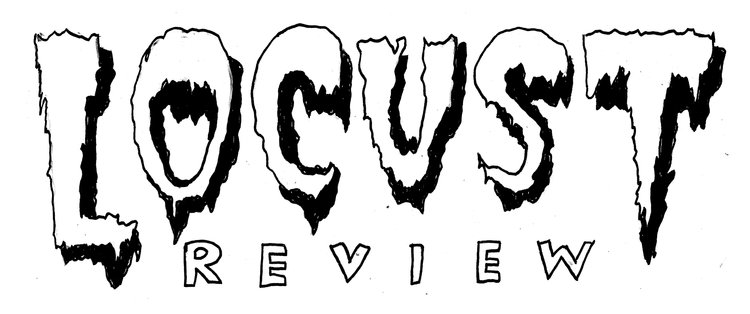Subscribe to Locust Review for as little as $1 a month.
Submit work to Locust Review by e-mailing us at locust.review@gmail.com.
Selected from Locust #2
The Wounded Tool Library Comic as it appears in Locust Review #2 and the glitched artifact in the Born Again Labor Museum.
Late at night, tucked into our matchboxes, / you would whisper to me about the big score.
Just as the words fell dead into the wind her data feed lit up red. The word WARNING dropped down from her data cloud.
Going to go to the mall / Pick up some pheno barbital (sustain)
the mouse is home alone sitting on his small mouse couch / he dropped a mouse quarter between his mouse couch cushions / his mouse hands no matter how small couldn’t fit between the mouse cracks
I left this world in a hot / flash / my body was as soup
He is such a stoic piece of marble that pigeons shit on him as he smiles. Your Boss wants to be your friend. His head is like a Thursday. His voice could best be described as 78 degrees with a slight chance of showers.
She knew that it would cure her. She didn’t really know she was dying. She hadn’t gone to the doctor. She couldn’t afford it. And anyway, the words being uttered terrified her. They would take her out of the dream of life. She had worked so hard to stay in that dream, refusing the accumulation of compromises that turn you into not-you.
Anupam Roy’s zine insert (in digital form) from Locust #2.
FOR SOME reason, impenetrable to any German leftist, there seems to be the strange US-American liberal assumption that Germany is a lederhosen-wearing, beer-sipping liberal paradise, where we hug refugees all the day, care for mother nature, and organize a perfect ‘socialist’ (in the liberal use of the term, meaning social-democratic) society, and with the guidance of a dear and democratic government, we care for our people and the world. While it will forever be a mystery for me how anyone could believe this in the first place, I am going to debunk this assumption in this article. My wager is that, by observing the current situation in Germany, we might find tendencies and latencies that elide developments within capitalist realism that are elsewhere still not fully feasible.
JAMES HAD a problem. He had no face.
Actually, he had a face and he knew he had a face. He could see it in the mirror. Eyes, nose and mouth were there where they were supposed to be; on the front of his head. He could see it but nobody else could. They saw through his face, around his face and everything but his face. There was nothing there, just visual ambience.
In December 2019 the Born Again Labor Museum and Locust Review issued our first “Irrealist Worker Survey” as part of our quixotic attempt to map the gravedigger’s multiverse. A selection of responses from you — our dear comrade readers — along with the survey questions, as printed in Locust #2, is posted here.
Balmletter is the quarterly newsletter of the Born Again Labor Museum, published as an insert in Locust Review. Here are some excerpts from Balmletter #1.
ON SCREEN: a woman appears in head and shoulders shot. She is smiling though inscrutable, beautiful but also very generic.
Woman: [With a floating accent] Hi there and welcome the Good Time Happy Fun Resort where excitement and relaxation go hand in head, for an experience you’ll struggle to remember.
I had two epiphanies during my artistic development. One was that our current political/social system was unjust and the second was those systems had always been unjust. I, like so many, had been conditioned to be obedient and not rock the boat. Sadly, it took the upheaval of the perceived status quo to open my eyes. Seeing that the mass media had replaced our subconscious, I wanted to subvert that in my work.
BY ONE in the morning, the largest vice house in the Theta District was closed. Most Silver Palms patrons were either long gone or passed out in a dark corner.
I pushed the broom across the black resin floor of Acid Room #2. My workphones played their slow pulsing tone just slightly faster than the ambient pulse back home in the Delta District, what we call Slate Town. Its ambient sound was soothing and slow. Workphones were designed to produce methodical drones. I wouldn’t have admitted it, but part of me was thankful for them. When paired with a time dilating energy drink, work went quickly. It was like turning your brain off.
I read somewhere once that, / people like me / never get to be / everything they wanted
MARK MILLER is the author of The Librarian at the End of the World (Montag Press, 2019). Adam Turl interviewed Mark Miller for Locust Review in early 2020.
Somewhere poetry shot itself.


